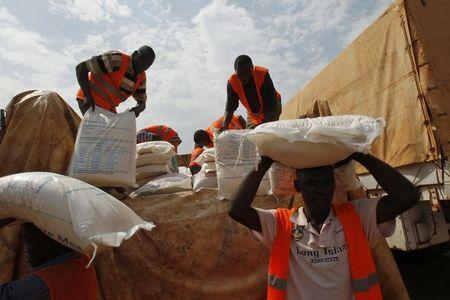Advertisement
Violence, unrest hinder Central African Republic aid efforts: agencies
DAKAR (Reuters) - Unrest and violence in the capital of Central African Republic which killed dozens, injured hundreds and uprooted tens of thousands of people are hindering the delivery of humanitarian aid across the country, aid agencies said on Wednesday.
Fighting broke out in Bangui just over a week ago after the murder of a Muslim man triggered reprisal attacks on a largely Christian neighbourhood, with armed gangs burning homes and looting shops and aid organisations' offices.
The latest violence, the worst in the capital this year, has killed more than 60 people, injured around 300 and displaced almost 40,000 in Bangui, according to the United Nations Office for the Coordination of Humanitarian Affairs (OCHA).
While the unrest has largely subsided, aid agencies describe the security situation in Bangui as volatile and unpredictable, with main roads unsecured and domestic flights suspended, and several have relocated staff and reduced or halted their operations.
This has cut off supplies of medicine, fuel and food to provinces which rely heavily on the capital, aid agencies say.
"Shipping supplies and aid overland is very challenging (and) lack of security on major roads also leads to commercial convoys, even with a military escort, coming under fire from armed groups and bandits," said Rodolphe Moinaux, country director for the International Rescue Committee.
Sectarian violence has plagued the mostly Christian nation since Muslim Seleka rebels briefly seized power in March 2013, and left some 2.7 million people - more than half the population - in urgent need of aid, according to the United Nations.
"We have our teams in the field that are still working, albeit at a reduced rate as we have no way to get either money or supplies to them," said Joan Carey, acting country director at the International Medical Corps.
Within Bangui, the violence has led to the closure of schools, which are being used to house those forced to flee and may not be able to reopen for several months, and made it difficult for aid organisations to reach health facilities.
"There are issues with patients who fled the hospitals when violence erupted... dozens of malnourished children, in particular, need to resume treatment quickly," said Donaig Le Du, spokeswoman for the U.N. children's agency UNICEF.
The intercommunal violence ended any hopes of holding elections scheduled for Oct. 18, and this may pose a further setback to aid efforts in the country, according to Ferran Puig Abos, country director for Oxfam.
"All this incertitude will destabilise the country even more, worsening access problems for humanitarian aid and increasing the risks for humanitarian workers," Abos said.



















Add new comment